- Gas Supply From Nigeria to Ghana, Others Drops
The West African gas pipeline has yet to recover from the impact of militant attacks on oil and gas facilities in the Niger Delta as gas flowing into it have been significantly curtailed.
The $1bn gas pipeline, operated by the West Africa Pipeline Company Limited, was built to supply natural gas from Nigeria to customers in Benin, Togo and Ghana.
Last year, Nigeria saw a resurgence of militant attacks in the Niger Delta that caused the nation’s production to plummet to a near 30-year low and disrupted gas supply to power plants.
The Managing Director, WAPCo, Mr. Walter Perez, told our correspondent that the company’s operation was severely affected by the militancy in the Niger Delta.
“Our business is still in place but the gas volumes have been significantly curtailed,” he said on the sidelines of the inauguration of the Ajido Community Health Centre in Badagry.
Perez noted that the continued shutdown of the Trans Forcados Pipeline had affected gas supply to the gas pipeline.
He said, “What we see is that the militancy is being addressed properly and that the volumes will come back.
“My understanding is that Forcados handles liquids that come from production of crude oil and so associated gas, as it is called, that has been connected to the facility, is not being available in the quantity that it was available prior to the militancy. Yes, it definitely affected our business, we believe. But we hope and pray that one day that will be a thing of the past.”
Commenting on the debt owed by Ghana for the supply of gas through the pipeline, the WAPCo MD said, “We are delivering gas now because we put arrangement in place for Ghana to prepay for the deliveries that they receive, and so that is working. We have every expectation that this will continue to work.
“There is a new government in Ghana, and so we are working with that government to understand what the situation is as we develop plans to retire the debt that they have accumulated.”
Ghana gets about 25 per cent of its power supply through gas from Nigeria, which flows through the pipeline via Benin and Togo. It has a deal with Nigeria to receive a contractual 120 million standard cubic feet of gas daily.
According to Perez, there is enough gas in Nigeria to supply all of Africa for a long time, with reserves of 187 trillion cubic feet of gas in the country.
He disclosed that WAPCo was considering “a pipeline enlargement whereby we will be reversing the flow on the West Africa gas pipeline.”
He also said, “When the pipeline was built, it was constructed so that the gas from Escravos and Utorogu (in Nigeria) can flow into our pipeline in a place called Itoki in Ogun State. Now, we envision that gas will enter the pipeline from many locations, the first of which is Takoradi (Ghana).
“One time, Takoradi was thought to be the major offtaker for the West Africa gas pipeline. At this point, in a year’s time, we will be reversing the flow from Takoradi to Tema using the West African gas pipeline. No one ever conceived that our asset will be used like this.”
Noting that gas would play a more prominent role in the world, Perez said, “You see liquefied natural gas being available almost everywhere. We are a gas pipeline company; we operate in four countries and the pipelines exist in the major load centres in each of the four countries.
“So, we think we are very well-positioned so that when the market grows, we will be able to meet the needs of the communities. I think gas is definitely a big part of the future for our economy.”

 Naira4 weeks ago
Naira4 weeks ago
 News4 weeks ago
News4 weeks ago
 Naira4 weeks ago
Naira4 weeks ago
 Travel3 weeks ago
Travel3 weeks ago
 Naira3 weeks ago
Naira3 weeks ago
 Jobs4 weeks ago
Jobs4 weeks ago
 Naira3 weeks ago
Naira3 weeks ago
 Investment4 weeks ago
Investment4 weeks ago






























